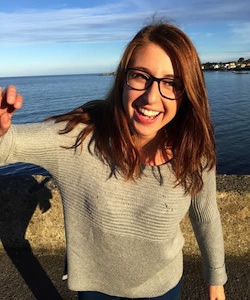Here in Dublin there are Protestants and, of course, there are Catholics. But what I anticipated I couldn’t find: lingering animosity between the two. Unlike in Northern Ireland where Catholics and Protestants still self-segregate in their respective neighborhoods, the Republic of Ireland remembers “The Troubles” with reverent solidarity for those who fought for Irish nationalism, not just the Catholics categorically. In learning this, I realized the terrorism that plagued Ireland for more than 30 years wasn’t necessarily about Catholics versus Protestants. Religion in many ways just helped delineate and exacerbate a tension that already existed—one between loyalists and nationalists. And while this was all a well and good history lesson for me to learn, it left me in a pickle. I came to Ireland to study its history of religious terrorism, only to find that religion was not only a small piece of a much larger puzzle, but a piece better studied in Northern Ireland. So, what’s a relentlessly curious Jewish girl in a Catholic country to do in the meantime? I’ll tell you: see what it really means to live in a so-called Catholic country and save my investigations about religious (or maybe not-so-religious) terrorism for my trip to Northern Ireland next month. It was time for me to focus on Dublin.
When I’m not entertaining my Irish classmates’ go-to American questions about gun control and Donald Trump, I ask them what it means to be Irish—to be them. But, my classmates often fit the Irish stereotype of unparalleled affability and as a result, they tend to tell me what I want to hear. Don’t get me wrong—I like hearing how much they love American Netflix and how closely they are following the presidential election, but alas, besides the obvious, where are all the red-headed people, and why doesn’t anyone say “top of the morning” here? I still had many unanswered questions. I wanted to know what it was means to live in a Catholic country, but I needed to find the right people to ask. The Irish that I’ve had the privilege of getting to know well, to my surprise, span the religious spectrum from traditionally Catholic to Protestant or agnostic, and through my conversations with them, I’ve come to understand Ireland as a peculiar place.
My first week in Dublin, while waiting in line to order my bus pass, I met the Irish girl standing beside me. She introduced herself and I did the same, and when I asked her where she was from, she hesitantly admitted she was from the Irish county Roscommon-South Leitrim. Between her unexpected sheepishness and my desperate attempt to conceal that I had absolutely no idea where or what that county was, I must have looked at her funny and what she said next confirmed it. Assuming that I must have recognized her county as the only county in Ireland to vote against same-sex marriage in this past May’s popular vote, she began to apologize. This amazed me—right before my eyes I witnessed collective guilt over inhibiting social progress.
Afterward I started wondering what separates the progressives from the conservatives in Ireland. My Irish friends would argue that abortion ranks first as Ireland’s most divisive social issue, but something about that didn’t add up in my mind. My family lives in Belgium—another Catholic country in Europe—but unlike Ireland, Belgium legalized abortion over 20 years ago whereas Ireland has yet to do so. What then makes a “Catholic country” a Catholic country?
Frankly, I don’t know yet. All I know is how much I have taken my right to choose for granted until now—until I moved to a Catholic country. Correction: until I moved to this Catholic country. Whatever that might mean.

